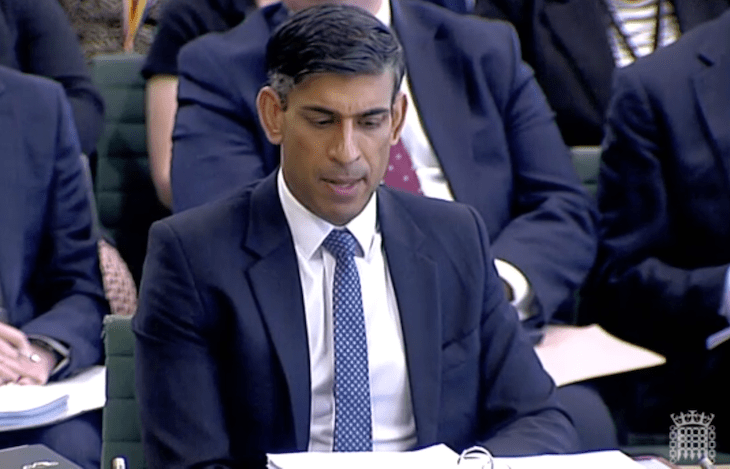Does Rishi Sunak think he’s going to hit his key targets? The Prime Minister had to answer this question repeatedly today after being asked by members of the powerful Liaison Committee. His basic answer was that he was still very committed to the targets – but couldn’t say that he definitely would meet them.
A particularly difficult set of questions came from Home Affairs Select Committee chair Diana Johnson, who grilled him on the details of how his Rwanda deportation policy would stop the boats, as Sunak has promised. The Prime Minister was very keen instead to talk about the agreement the government had struck with Albania, but said he was confident that the government would succeed in its appeal against the Court of Appeal ruling on Rwanda. ‘Our belief remains that the plan that we have is legal, it’s compliant with all our obligations, and we’ll be appealing it vigorously.’
Johnson pointed out that the Rwandan government had said the capacity of the scheme was 500, while more than 8,000 people had come to Britain on small boats. She asked, ‘if we assume your Rwanda policy is upheld in the Supreme Court, Rwanda has said they can take a capacity of 500 people, so that leaves 7,628 who have come across since the bill was introduced, what do you intend will happen to those people?’ The PM replied that he wouldn’t go into the details of a commercial contract, but that the Rwanda scheme was uncapped. He didn’t say this, but ministers are also trying to find other governments who might be interested in similar schemes in their countries – so far without any success.
Sunak then refused to offer a percentage probability on meeting his target to halve inflation. That question came from a member of his own party, Treasury Select Committee chair Harriett Baldwin, who kept asking him how likely it was that he was going to do this by the end of the year. Sunak said he was ‘working 100 per cent to achieve that’, and ‘all I can do is keep throwing everything at it’. He did insist that ‘of course I support the Bank of England’, adding ‘I don’t think anyone thinks we should return to a world where the government is setting interest rates.’
Despite frustration within Conservative circles about the way the Bank has handled the current economic situation, Sunak is very cautious about appearing to criticise it, given the turmoil of the Liz Truss weeks was in part down to her threats to the independence of the central bank.
The Liaison Committee is a cross-party group of select committee chairs and as such it generally has a non-partisan culture, but its tone does tend to shift as an election looms. As the session went on, the committee chairs reverted more to their party lines.
Under more partisan questioning from Catherine McKinnell, who chairs the Petitions Committee, the Prime Minister said he took responsibility for the fact the UK has the highest inflation rate in the G7 and the lowest growth projections. He had a scrap with Chris Bryant over his absence from the next two Prime Minister’s Questions – though Bryant tends to be rather pedantic about this with members of any party.
Sunak grumbled back that he didn’t think Bryant was really suggesting he should miss representing Britain on the world stage at next week’s Nato summit, and argued that it was important for him to attend a Westminster Abbey service for the NHS tomorrow. But Bryant tied it in with the government announcing the NHS workforce plan on Friday to the press and not in parliament first. Sunak’s response was that he did pay proper regard to parliament and made a point of bringing things to the House as soon as he could. He has been better at this than his two predecessors, in fairness, but that’s a pretty low bar. It’s not a bar Sunak will be particularly worried about either way, when the targets he has set for himself now look too high to reach.







Comments